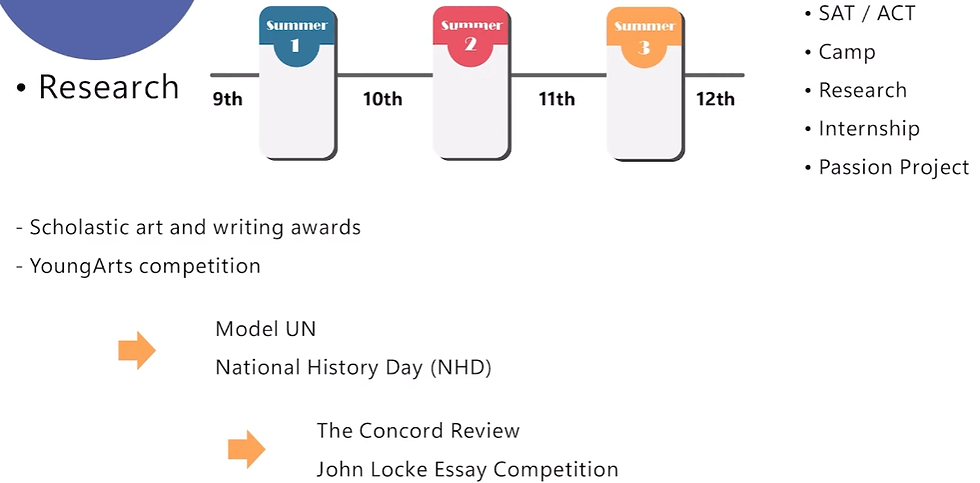
A ONE INSTITUTE
Jan 22, 2025
Today, we're going to discuss what to do during summer break.
Feeling unsure about how to spend your summer?
Many of you wonder whether to prepare for an internship, study for the SAT, go to camp, conduct research, or pursue other activities. Today, I'll explain the perspective you should have in order to prepare for summer break effectively.

You’ll experience three summer breaks in high school: the first one after 9th grade, the second one after 10th grade, and the final one before applying to college after 11th grade.
Choosing How to Spend Your Summers
There are plenty of choices: camps, SAT study, research, internships, passion projects, volunteering, etc. For camps, I often recommend high-achieving students to prepare and apply to top-tier programs. Most top-tier camps have age restrictions, so you can usually only apply when you're older. It's ambitious to try to prepare for these camps just 3-4 months before the application deadline.


With standardized tests, for example, aiming for an ACG score of 34-35 or an SAT score over 1500 requires having strong English scores. You need to wait until your English scores improve enough to start studying seriously for these tests.
Top-tier camps also require good test scores, school transcripts, essays, and teacher recommendations. For research, you'll need a foundation of knowledge and interest in your chosen field, which takes time to build. Similarly, internships require passion and related knowledge to increase your chances of success. Passion projects also need a trigger for interest in a specific field.
Combining all these considerations, we can see that preparing for these opportunities successfully requires time. You usually get a chance to apply to high-level camps after 10th or 11th grade. To prepare, having good school transcripts and standardized test scores is crucial. Teacher recommendations and essays are also important, so gaining various experiences is beneficial.
If you are looking for slightly easier camps to get started, using Chat GPT can be helpful. If you’ve heard of the Clark Scholars Program, try asking GPT about other slightly easier camps for younger students. Checking the lists and doing further research on their websites can be useful.
Applying to less competitive camps may not require transcripts or essays, but there could be a participation fee. Even if a student isn't interested in a specific field yet, simply experiencing a camp can be meaningful.
Conducting Research
When it comes to research, consider submitting your work to ISEF or publishing it in competitive journals like JSHS. For science fields, most students attempt these in 11th grade, so you should prepare in advance. Examples include participating in the Science Bowl or Science Bee. Approaching these experiences with interest can help the student develop a passion for the subject. If you want to study deeper, preparing for an Olympiad can also be a good experience, regardless of the outcome.

Building on these experiences, you can start your research. Even if you don't win awards, the knowledge gained can be used in essays for camp applications or passion projects. So, it's important to start these experiences as early as possible.
Non-STEM students can participate in competitions like the Concord Review or John Locke Essay Competition, or take part in Model UN, Model Congress, and Debate.

These experiences are valuable regardless of the outcome and can be included in applications and essays for top-tier camps.

In conclusion, preparing and taking action early is beneficial. Refer to the eight categories of EC activities I’ve mentioned before. Reflect on the activities you've done so far and consider whether to strengthen your focus on an area you’re already invested in or venture into a new field. Both choices are valid, so follow your interests and plan your summer accordingly.
Hope this helps you plan a productive and meaningful summer! Thanks for reading.

